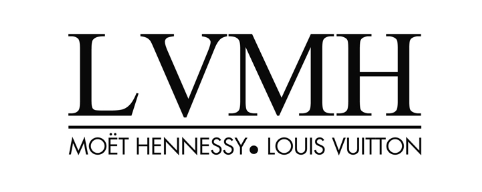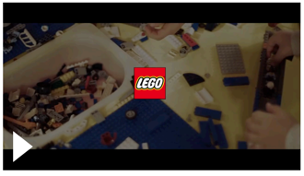Sustainability – the next retail revolution
A consumer revolution is upon us. Shoppers are increasingly demanding sustainable products, or those with low ecological impact.
LVMH announced its collaboration with Google Cloud
Thanks to Google’s expertise, LVMH will focus more on AI and personalization.
This partnership will help LVMH developing new solutions to provide a more personalized customer experience. Indeed, LVMH expects to better predict consumers’ demand and optimise stocks. These innovative solutions should be based on machine learning and artificial intelligence. Today, managing data with the help of tech giants is a way for retailers to better know their clients and provide them with more relevant services.
M&S Offers a range of women’s clothing to rent
Ahead of Christmas, M&S has made a range of women’s clothing available to rent. For now, this new service is under a trial. It will allow the brand to better understand new consumers’ behaviors toward sustainable consumption. M&S chief operating officer Katie Bickerstaffe said on RetailGazette:”As we grow M&S clothing, we want to be more relevant more often and we know customers are increasingly interested in the circular fashion economy”. This additional offer is introduced at a time when more and more retailers address the growing sustainability concerns around fast fashion.
LIDL comes up with a smart idea to reduce plastic and help customers cut costs in the UK
The brand has launched a smart laundry detergent refill station. Once the bottle is purchased, customers will be able to refill it with detergent when they run out of it. The refill bottles have been designed with a UK-first smart chip, which makes the machine able to identify and remember each bottle. This project shows Lidl’s growing commitment to technology, sustainability, and customer experience.
L’Occitane and Lego promote going green again
French natural beauty brand L’Occitane, opened on 22 January 2021 its world’s first #MEGA Sustainability Concept Store in Hong Kong to offer ‘’an invitation to the public to explore how we can reduce plastic pollution. The #MEGA stands for #MakeEarthGreenAgain – engages the public in environmental protection in a fun way with a reward program that offer rewards to shoppers who are bringing their beauty product empties to the store’s recycle bins, completing a 3-min personal carbon footprint evaluation. The #MEGA store supports A Plastic Ocean Foundation (APO) to transform post-consumer plastic into recycled plastic (rPET) products.
The brand Lego offers children the possibility to educate themselves by rebuilding existing LEGO sets. To do so, additional instructions called ’Green Instructions’ are proposed and allow them to transform their initial item into another one. For example, they can turn planes into electric trains, cars into bicycles, coal mines into electricity generating windmills. In addition, the company also released video lessons to allow teachers to educate their pupils about climate change.
Waitrose and Partners preach good quality
A survey of 1,500 U.K. buyers from product information management company, inRiver, found that 90% of consumers are willing to purchase an item that’s been designated as environmentally friendly, with nearly half (47%) willing to pay more for these items.
The British grocer Waitrose has embarked on a new campaign that gives pride of place to the quality of its products, leveraging the trend of slow food. The “Slow TV” campaign emphasizes the excellent taste of the products that can be found in the Brands‘ supermarkets, with the phrase “You can taste when it’s Waitrose & Partners.” The campaign documents the Retailer’s commitment to sourcing the highest quality ingredients, while supporting animal welfare and production standards.
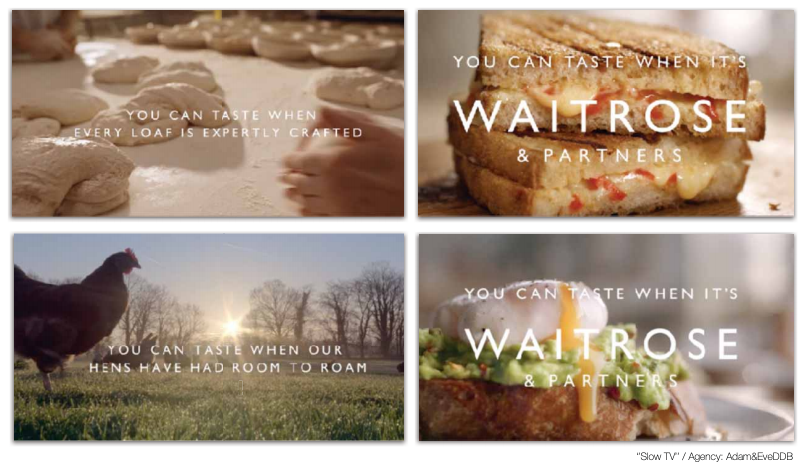
Ikea’s efforts to become the most sustainable retailer
Ikea continues to follow its strategy to inspire changes in lifestyle and consumption. The Swedish retailer has ramped up its bet on smaller city-centre stores that are accessible by bike and public transport. In addition to shifting towards urban consumers, Ikea seeks to shrink its carbon footprint, including the pollution from customers driving to suburban big blue box stores. In line with this, Ikea has introduced a new concept for a physical store without parking spaces. The first of such will be built in central Vienna.
The Company explains on its Austrian website that “the whole building is geared towards pedestrians, subway and streetcar riders, and cyclists.” The building will be surrounded by greenery as a part of the sustainability strategy and will incorporate a cooling system to deal with increasing heatwaves in cities. With the Vienna project, Ikea confirms its positioning as a retailer sending a meaningful message and a creator of a movement for a more sustainable everyday life.
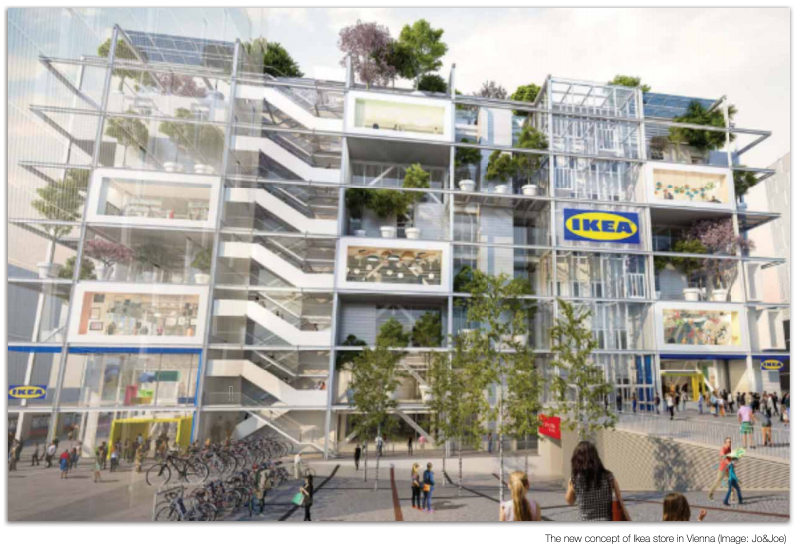
Elsewhere, Ikea has opened its new urban concept store in Szczecin, Poland, where visitors can learn how to introduce environmentally friendly solutions into their homes. “The Ikea Home of Tomorrow” was designed to take into account the circulation of food, water, waste and other resources between the different rooms, creating an inside house circular metabolism with a large home garden as the heart of the system. Ikea has proven that it is possible to grow vegetables, herbs and several species of mushrooms inside the apartment. The goal is to promote sustainability in urban environments and an eco-friendly lifestyle that limits the amount of waste produced by households.
Decoding fashion choices: ecological impact matters
The Clear Fashion app provides the users with supply chain details about the brand and is focused on four main categories in their brand analysis: the human aspect (providers’ transparency, the welfare of employees), health (chemicals used for the production), environment (water use, carbon footprint, biodiversity) as well as animal welfare. Thanks to Clear Fashion, users can discover a thorough analysis of more than 70 fashion brands (for now).
Clear Fashion, Yuka (a French product-scanning app) and other scanning applications are attracting significant attention as consumers search for more transparency, and prefer to purchase from brands that are good for their health and environment. The growing popularity of scanning apps has to be taken into account by all retailers, as it changes shopping behaviour profoundly.
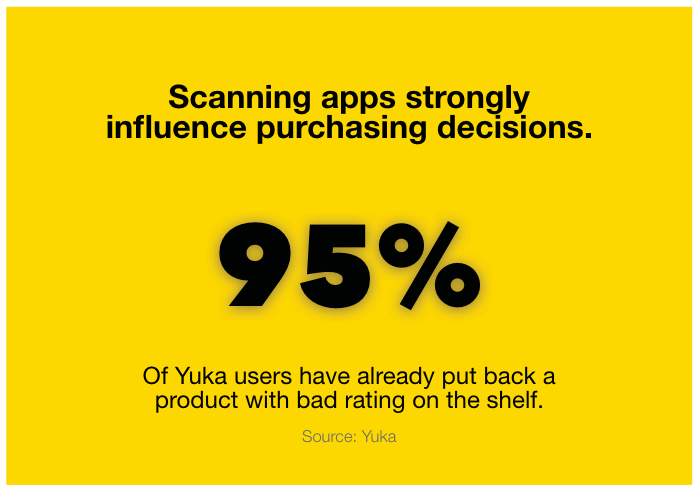
As the focus on sustainability has been embraced by consumers in a big way, the list of the retailers that are tapping the second-hand market is booming and continues to be one of the biggest topics in 2020. The German online retailer, Zalando, is positioned to leverage the new trend – High-Low Fashion – that consists of mixing high-end with fast-fashion and/or vintage clothing. The pre-owned shopping section on the website will be introduced from the third quarter of 2020. Moreover, Zalando plans to enter the territory of second-hand resale platforms like Vinted or Depop, as new features allow buying and selling items between users.
Aware of the ecological impact of fashion, Zalando has also become the first e-retailer to make the completion of the new SAC Higg Index mandatory for every brand that it carries on its e-commerce platform. The Higg Index is an innovative tool that measures the efforts made by fashion brands in terms of social and environmental responsibility. By 2023, Zalando will only distribute brands that will meet ethical and eco-responsibility standards. This means that all brands retailed by Zalando, from Nike, Mango and luxury labels like Armani and Maxmara, will have to submit their sustainability calculations. Aside from setting the sustainability targets across its portfolio of brands, Zalando will be building on its existing commitment, with new goals to reduce operational carbon emissions by 80%.
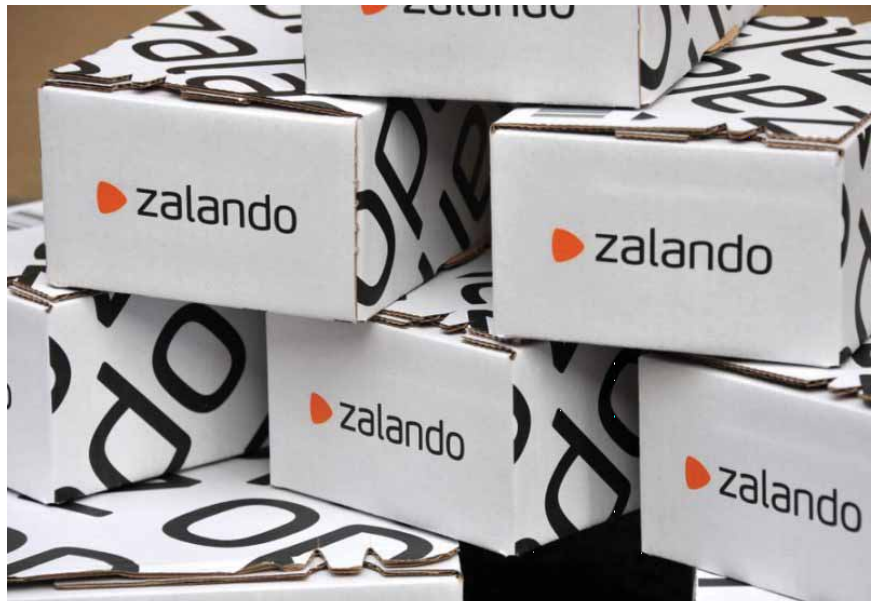
Returns from online purchasing of merchandise is a serious environmental problem. Free returns come with a cost for the planet. In order to limit the problem, Asos decided to at least digitize the return paper forms. By doing so, the British fashion retailer will save 64 million paper returns inserts – the equivalent of 320,000 kg of paper and about 8,450 trees.



